
https://www.youtube.com/watch?v=ChntJVuErlg
The 7 WARNING Signs of a B12 Deficiency - Dr. Berg
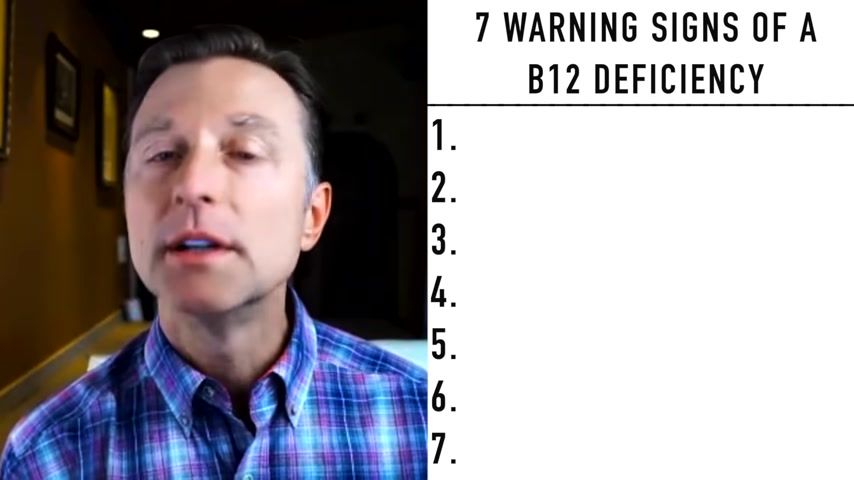
Let's talk about the 7 warning signs of a B12 deficiency .
Now , B12 is it's kind of an important vitamin .
It's involved in making DNA , myelin sheath , which is the coating around the nerves .
Like in this wire , if we were to take off the outside coating , okay , that would potentially short circuit .
Same thing that happens in your nervous system .
We'll cover that .
Also , B12 is involved in making things like red blood cells , which is kind of important .
So B12 is , very , very vital .
And it's important for you to know these symptoms because there's usually like 7 big symptoms that are not necessarily related , but it's important to identify them .
Because one thing about a B12 deficiency is that if you're deficient , you can actually experience irreversible damage to your nervous system .
So we're gonna cover all that .
But I first wanted to mention , one thing about the type of B12 .
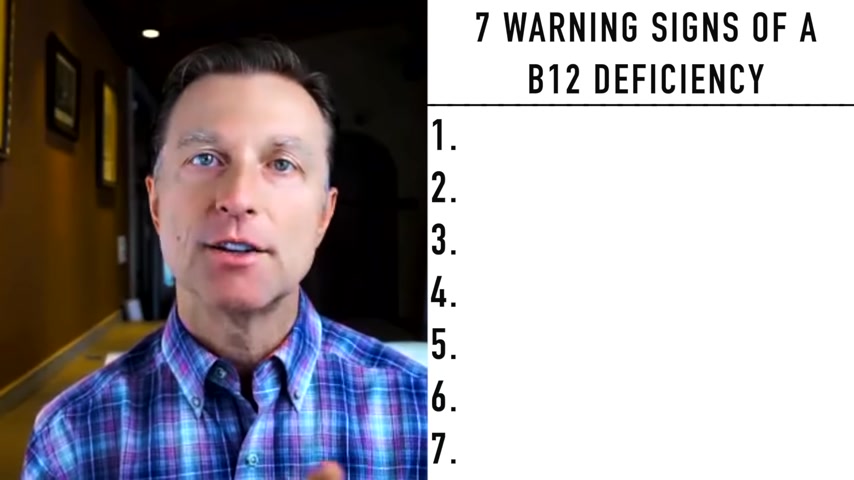
There's 2 types .
There's a natural version of B12 and there's a synthetic version .
Of course , I'm gonna recommend always take the natural version .
And the natural version is called methylcobalamin .
That's the one that you wanna take in your supplements .
The other one that's synthetic that I don't recommend is called Cyano cobalamin .
I recommend you avoid that one because it's synthetic .
Now what's kind of interesting about B12 is that , the main reason why people are deficient is not necessarily that they're not eating foods with b 12 .
It has to do with malabsorption or just they're not able to absorb B12 .
The B12 absorption is very complex .
There's a lot of things that are happening , from the stomach to the small intestine and the absorption .
Your body needs , this carrier transportation protein to help you absorb it .
It's called intrinsic factor .
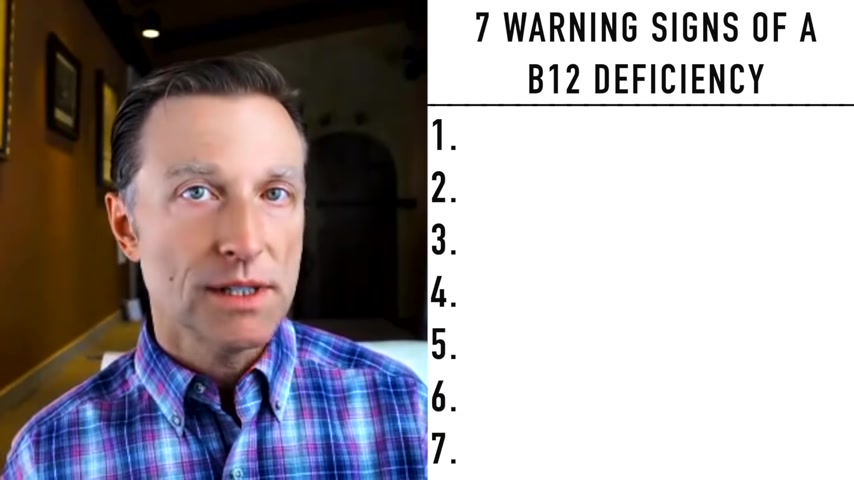
And , if you don't have it or you have an autoimmune disease , you can get something called pernicious anemia , which I don't want to get into that but it's a another problem because you have an autoimmune disease to this thing called intrinsic factor or the cells that make it , which is in the stomach .
But the point is that the reason why people can't absorb it is because they either have some type of atrophy of the stomach , or they're lacking hydrochloric acid , or they have gastritis , or they have an ulcer of the stomach , or they have celiac or Crohn's or irritable bowel syndrome further into the digestive tract .
So any of these conditions can severely block the absorption of B12 .
And so many people have those issues , and then they become deficient in B12 because they don't connect the dots .
They don't understand to absorb B12 , you need a good digestive system .


And B12 is very common in the elderly .
About 20% of everyone over the age of 60 has a B12 deficiency .
Now , personally , I think that the big reason is the lack of hydrochloric acid , either production or they just don't have the the concentration of acid in their stomach .
It's as we get older , we lose the , acidity of our stomach and also the ability to absorb B12 .
And so this is another reason why I recommend everyone over the age of 55 start taking things to acidify the stomach like retained hydrochloride , like apple cider vinegar .
That alone will just start increasing B12 , and the person will start having more and more energy .
Now we don't need much B12 .
We need it in micrograms , not milligrams .
So an average person would need anywhere between 2.4 micrograms to 2.8 micrograms .
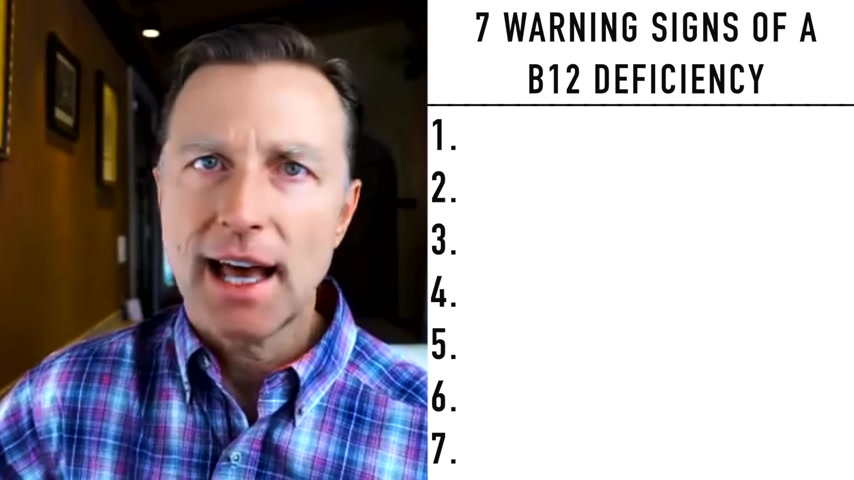
Very small amounts , but when you buy a B complex product , which you have to be careful because most of them are synthetic .
When looking at the label , it will say they're like 1000 to 5000% more B12 than your body really needs .
So there is some problems with excessive amounts of B12 .
But typically with B12 , I recommend you get it from the diet .
It's very easy to get from the diet .
So let's talk about the foods that you can get B12 .
Of course , animal liver , okay , like beef liver , you're going to get a lot of B12 or kidney .
Okay ?
Personally , I don't like liver or kidney , but you can get it as a supplement if you're anemic .
Clams and other seafood .
Sardines , beef .
Okay .
Other meats , chicken , fish , some fermented products like kimchi sauerkraut might have B12 Also , fermented dairy as in cheese has some B12 .
Insects , have B12 .
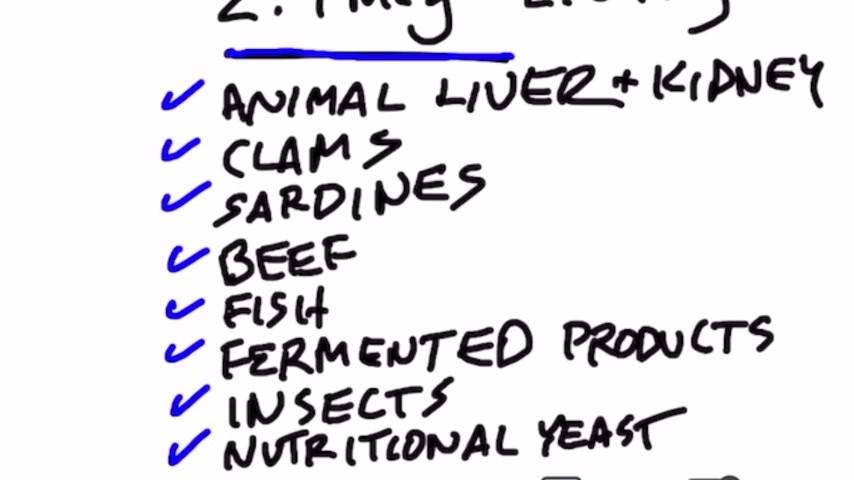
So if you ever get the hankering for , you know , crunching on some insects , you get some B12 .
And also nutritional yeast , but not really .
Because when you buy nutritional yeast , a lot lot of times it just says it's fortified and so they add a synthetic B12 to it and I don't recommend that .
I do have a nutritional yeast product and I do add one thing to it and that is the natural version of B12 , methylcobalamin .
But many nutritional yeast products are fortified , and anytime it's fortified , they always use synthetics and it's from usually petroleum .
And so I don't recommend fortified nutritional yeast .
Now another interesting thing about B12 , especially if someone's a vegan or vegetarian is that , they don't eat animal products .
So usually they're going to be deficient unless they take B12 .
And when I had my , wheatgrass juice powder product evaluated , I had them test B12 just to see if there was an AB12 in it .

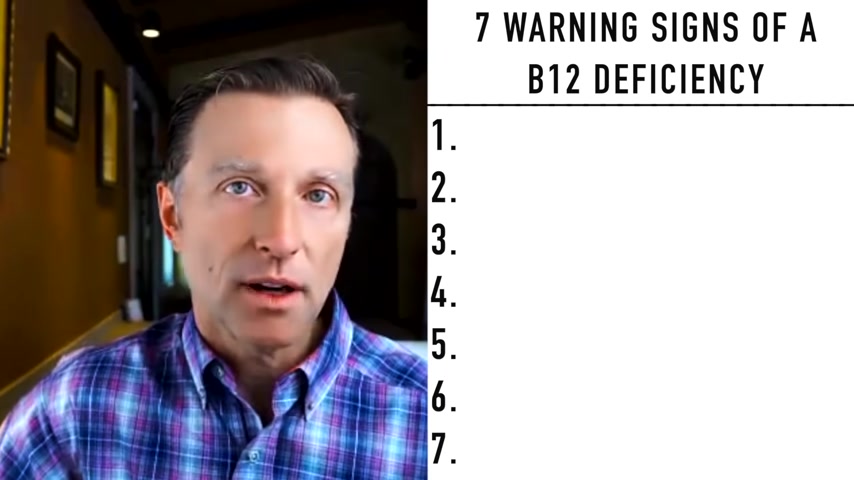
And I was actually shocked to find that it was double what our requirements were .
And I thought it was a mistake .
But where that B12 is coming from is the bacteria living in that nutritional yeast product because we don't use high heats and it's done , in temperatures of nothing greater than 106 .
So apparently microorganisms that live around plants can make B12 .
All right , let's go through these symptoms .
There's 7 of them .
Okay .
Number 1 , pale skin .
Now , why would you experience pale skin ?
Well , because you're not able to make red blood cells and you're not getting the oxygen .
And so your body is starving of oxygen and you're looking a rather pale , like you would see in someone that's anemic .
Now , sometimes your skin might be a little yellow or jaundice because the red blood cells are fragile and the byproducts can then create that appearance .
All right .
Number 2 , you're going to feel constant fatigue , weak .

You're always going to be sleepy and drowsy no matter how much you try to get some sleep .
That is because without oxygen , your metabolism can't work .
You're just going to be always tired .
Alright , number 3 , mouth problems .
You may have ulcers in your mouth .
You may have a shiny , swollen red tongue .
Why ?
Because the tongue is not able to get oxygen , and it's swelling up .
All right .
Number 4 , cognitive issues .
So without B12 , you can be very , very depressed , severely depressed .
You can have anxiety .
You can have memory problems .
You can have paranoia .
You can be delusional .
Your thinking really gets thrown off if you don't have enough B12 because both the brain and the nervous system need B12 .
When the brain doesn't get oxygen , it just cannot work .
All right , number 5 .
And this does relate to the cognitive function , but nerves , okay .
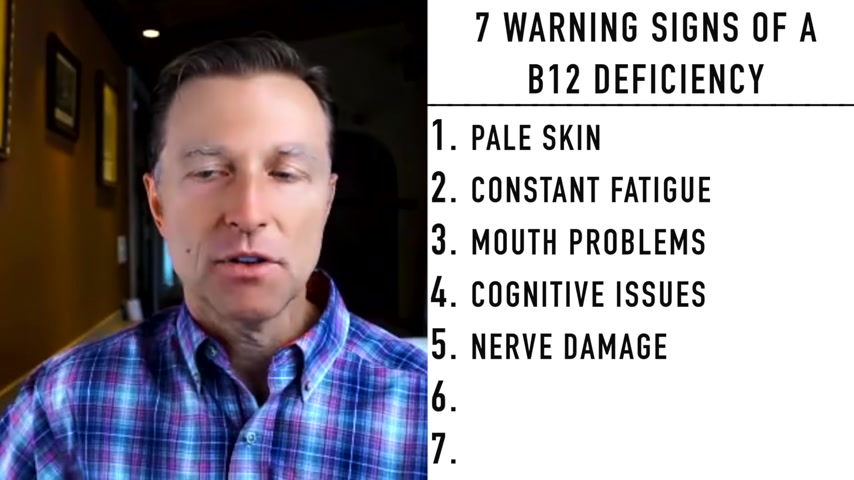
If you're deficient in B12 , you're not going to be able to make myelin .
Myelin is the coating around the nerves like they talked about .
And so if you can't make this myelin , you're going to start getting a short circuiting problem in the nervous system .
And that's going to show up as peripheral neuropathy .
Now , what's the definition of peripheral ?
Well , the outer edges of something right , and neuropathy neuro nerve pathy means disorder .
So it's a disorder of the nerve on the outer edges of your body , like your toes or the bottom of your feet , or your fingertips .
In practice , I've usually noticed that it was mainly in the feet , not the hands , but it can occur in the hands .
So we have peripheral neuropathy .
Now , if you're very severely deficient in B12 , you can experience irreversible nerve damage , and you can be in severe pain .
I mean , it's , it's really , really bad because it's irreversible .
So what are you gonna do ?

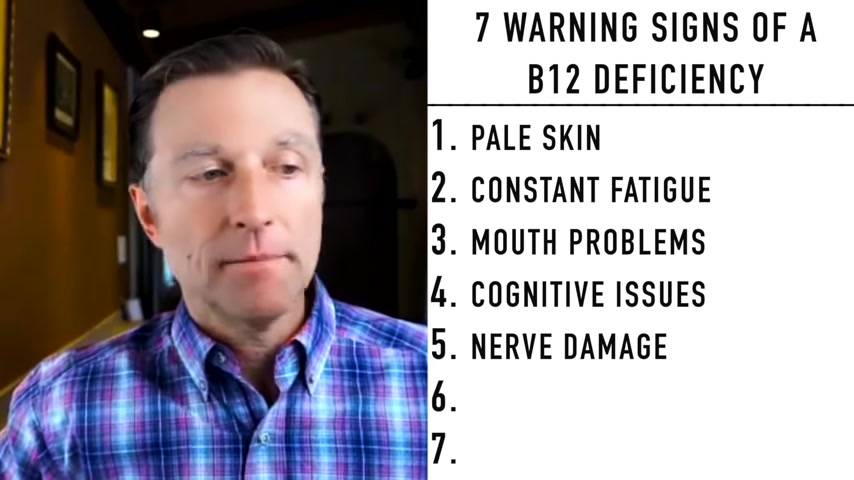
So this is why I'm doing this video so you can catch it before it creates irreversible nerve damage .
I mean , in practice , I had a guy come in with this problem .
Okay ?
It was so bad .
He really wanted to commit suicide because it got to the point where he just couldn't get rid of the pain .
And so now he basically is forced to live on , medication permanently , which is terrible .
All right .
Number 6 , blurred vision .
Why ?
Because what helps you see is the retina .
The retina is neurological tissue that is in your eye , and it goes directly back into your brain .
And if that's affected , you're not going to be able to see that well .
So one symptom would be noticing that you , you know , your vision is worsening and you need glasses for no reason .
Suspect a potential B12 deficiency .
Alright .
And the last symptom would be a fast pulse rate .
Now why would the heart start increasing its beats ?
Well , that is because you can't make red blood cells .
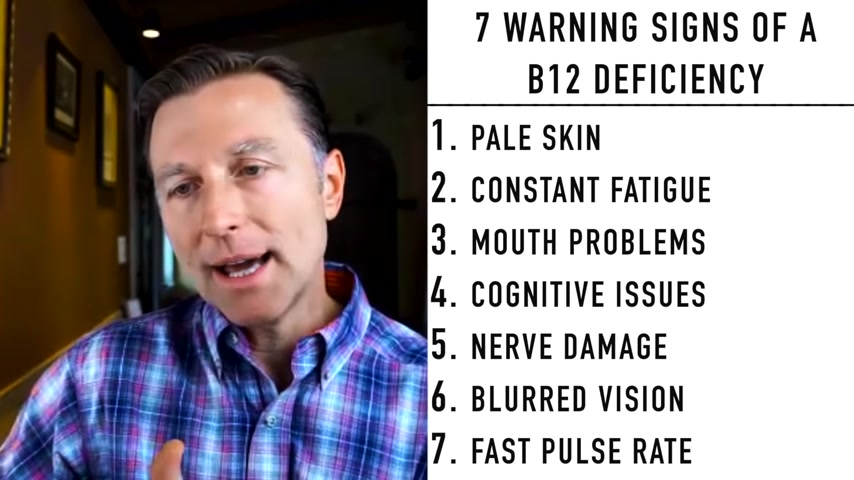
So that means you're not gonna have oxygen and the body has to compensate for a lack of oxygen by increasing the rate or speed at which your heart pushes , blood through the body .
So anyway , I just really wanted to increase your awareness on B12 .
Now that you understand B12 , I think the next most important vitamin to understand would be vitamin B1 .
And check that out , I put it right here .
Are you looking for a way to reach a wider audience and get more views on your videos?
Our innovative video to text transcribing service can help you do just that.
We provide accurate transcriptions of your videos along with visual content that will help you attract new viewers and keep them engaged. Plus, our data analytics and ad campaign tools can help you monetize your content and maximize your revenue.
Let's partner up and take your video content to the next level!
Contact us today to learn more.